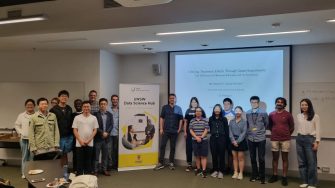
Earlier this year, uDASH and the School of Marketing hosted a workshop on Difference-in-Differences (DiD)—an analysis method that is a widely used for evaluating the impact of an intervention or treatment.
We welcomed the speakers, Professor Nils Wlömert and PhD candidate Daniel Winkler, from the Institute for Retailing & Data Science at the Vienna University of Economics and Business (WU Vienna).
The aim of the workshop was to bring together researchers from various disciplines and provide a solid understanding of the basics of Difference-in-Differences (DiD) analysis. This included recent developments in the field such as differences in treatment timing (staggered adoption), synthetic DiD, and violations of the parallel pre-treatment trend assumption.
The workshop was held in an interactive format and integrated theory with practical implementations using R.
Through real-world examples and hands-on exercises, participants gained the skills to apply DiD in their own research.
Highlights
- Difference-in-Differences is a data science approach that uses quasi-experimental variation in data to infer causal effects. For example, due to some random event, a treatment group undergoes a treatment whereas a control group does not. DiD then compares the differences between groups and differences before and after the random treatment, and hence the name
- Building on 2021 Nobel-prize winning work, this workshop covered the conceptual, methodological, and operational knowledge required to use DiD to infer causal relationships between variables in the absence of randomized controlled trials
- There were 45 participants from various disciplines across the university
- The hands-on workshop offered examples and exercises in R to enable the participants to apply what they learned
- The workshop triggered discussion about potential applications to the participants’ current research projects
- Participant feedback was very favorable; participants particularly highlighted the hands-on approach, enabling them to put the acquired skills into practice
- All course materials are available via GitHub: https://github.com/WU-RDS/did.
